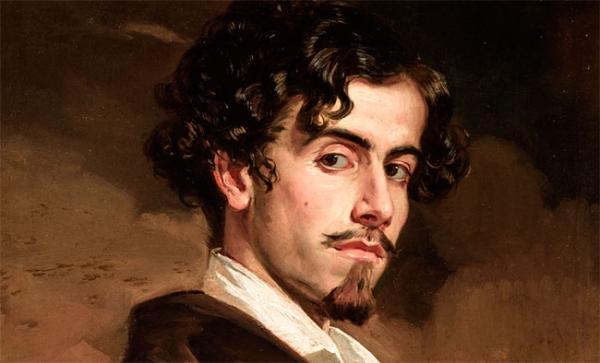4.2 Rima LIII, "Volverán las oscuras golondrinas” – Gustavo Adolfo Bécquer
7 min read•june 18, 2024
Riya Patel
AP Spanish Literature 💃🏽
24 resourcesSee Units
"Volverán las oscuras golondrinas" is a poem by Spanish poet Gustavo Adolfo Bécquer. The poem is a nostalgic reflection on the transience of life and the idea that love and happiness will eventually return. The title, which translates to "The Dark Swallows Will Return," refers to the birds as symbols of the cyclical nature of life.
Context Behind “Volverán las oscuras golondrinas”
Having these contextual pieces is super important to be able to elaborate not just in the introduction but throughout the free-response questions (FRQs) as you establish connections.
Author Background
The well-known Spanish poem "Volverán las oscuras golondrinas" was written by Gustavo Adolfo Bécquer. Bécquer was a Spanish Romantic poet and author who was well-known and lived from 1836 until 1870. He was one of the most important authors in Spanish literature and was born in Seville, Spain.
Melancholy (sadness), and introspective themes of love and passing aspects of life are frequently explored in Bécquer's art. His poetry exhibits an in-depth understanding of human nature and a strong sensitivity to human emotions.

Image Courtesy of UNPROFESOR
Time and Place
📜Historical: "Volverán las oscuras golondrinas" was written during the mid-19th century, a time of significant social and cultural changes in Spain. Political unrest, the end of Spanish imperialism, and the Romantic movement's influence on literature and art were all prominent features of this time period.
🗺️Geographic: The poet, Gustavo Adolfo Bécquer, was born in Seville, Spain, where the poem was written. Spain's physical location, together with its illustrious past, varied landscapes, and close proximity to the Mediterranean Sea, probably had an impact on the poem's imagery and mood.
Societal Context
👑Political: Spain was going through turmoil in politics at the time Bécquer was writing. Political unrest shaped this time period because there were frequent changes in power and conflict between conservative and liberal factions.
🧑🏽🤝🧑🏻Socio-economic: Socioeconomic inequalities and economic decline characterized Spain's mid-19th century. The nation had to deal with issues including poverty, rural population decrease, and limited potential for social mobility. These socioeconomic factors could have impacted the melancholy mood and the notion of unreachable bliss in "Volverán las oscuras golondrinas."
🎭Cultural: The poem was composed during the Spanish Romantic movement, which placed an emphasis on individualism, strong feelings, and a relationship with nature. As a Romantic poet, Bécquer leaned on these cultural influences to convey strong feelings and delve into the complexity of the human experience. The poem's lyrical beauty and emphasis on love and loss are in line with Romanticism's cultural currents.
Need to Know About "Volveran las oscuras golondrinas"
These are all essential pieces of information that are good to memorize for AP success!
Characters
"Volverán las oscuras golondrinas" does not have the conventional narrative structure of a story with clearly defined characters. The poem instead emphasizes the concepts of the passing of time and of lost love. The poem mostly focuses on the speaker's feelings and reflections, who is neither clearly named nor given a clear role.
The poem's main figures have symbolic and metaphorical meanings. The "oscuras golondrinas" (dark swallows) stand for love or happiness gone and never to be found again. They stand for the temporary quality of happiness as well as the certainty of change and loss.
The poem can focus on general feelings and experiences rather than particular people due to the fact that there are no specified characters. Human dilemmas, longing, and a keen understanding of the brief nature of life and love are the main points of emphasis.
Literary Devices
Some of the literary devices used in this text include:
- Paralelismo: Parallelism is used in the poem "Volverán las oscuras golondrinas" to produce a rhythmic and well-balanced framework. The poem parallels structures to underline important concepts or create a sense of harmony in the poetry by repeating words or using similar syntactic patterns.
- Anáfora: By repeating a word or phrase at the start of subsequent lines, anaphora is employed in the poem to stress particular feelings and concepts. This repetition gives the poem a rhythmic effect and increases its overall impact by bringing the themes of loss and longing to light.
- Encabalgamiento: "Volverán las oscuras golondrinas" uses encabalgamiento to produce a smooth and continuous movement between lines. Instead of using conventional line breaks, the poet intentionally carries a thought or sentence fragment from one line to the next. This method keeps the poem's flow and emotional intensity intact.
- Pie quebrado: The rhythm and cadence of the poem are occasionally changed by the use of irregular feet, or "pies quebrados". These deviations from the established rhythm in the meter give the poem an unpredictable feel and draw attention to particular words or phrases, highlighting their importance.
- Hipérbaton: In the poem, hipérbaton is utilized to change the usual word order for emphasis or poetic effect. The poet alters the syntax and departs from the accepted grammatical order. By using this strategy, the poem's language gains a recognizable and unforgettable aspect as well as a sense of poetic tension.
- Exclamaciones: Exclamations are used throughout the poetry to express strong feelings and increase the emotional impact of specific phrases. These exclamations convey the speaker's fervor, longing, or sorrow and heighten the reader's perception of the piece's intensity and emotional impact.
Summary of "Volveran las oscuras golondrinas"
Gustavo Adolfo Bécquer's Spanish poem "Volverán las oscuras golondrinas" tackles themes of lost love and the fleeting quality of happiness. The speaker laments the passing of time and longs for the return of the dark swallows, a representation of bliss gone and ultimately, unrecoverable. The rhythmic pattern, parallelism, and anaphora of the poem highlight the theme of longing and arouse sorrow. Exclamations emphasize the speaker's emotions while encabalgamiento and hipérbaton tactics generate a fluid and dynamic flow of thinking, improving the poem's overall effect.
The poem makes the point that joy is temporary and that even the most treasured memories fade with time. The poem's meter is disrupted by Bécquer's use of irregular feet, or "pies quebrados," which emphasize some words and lend an air of unpredictability. "Volverán las oscuras golondrinas" captures readers with its poetic beauty and exploration of universal emotions, striking a profound resonance with the human experience of love and sorrow. The imagery and poetic devices in the poem come together to produce a classic work of literature that never ceases to move people and stimulate thought.

Image Courtesy of Amino Apps
Themes in "Volveran las oscuras golondrinas"
El tiempo y el espacio
"Volverán las oscuras golondrinas" analyzes the concepts of time and space, portraying the passage of time as an invincible force that molds our existence. The poem considers the transient nature of joy and love, implying that even the most treasured memories and experiences inevitably fade with time.
La naturaleza y el ambiente
The poem emphasizes nature and the environment, with the swallows serving as a metaphor for the natural world. A sense of the seasonality of life and the relationship between human emotions and the natural world is evoked by the mention of swallows and the changing seasons. The poem's emotional depth is further enhanced by the use of natural imagery, which also makes us think about the bigger forces at work in our lives.
Las relaciones interpersonales
The story "Volverán las oscuras golondrinas" explores the subject of human connections, particularly the experience of lost love. The poem expresses the wish for the resumption of previous ties as well as the profound emotional impact of broken connections. It examines the intricacies of interpersonal relationships while emphasizing the strong feelings that love and sorrow can arouse.
El amor y el desprecio
The poem explores themes of love and contempt in combination. While the speaker laments a lost love, there is also an underlying sense of hatred and bitterness. The contrast between love and hate deepens the poem's emotional landscape by illuminating the paradoxes and complexities that characterize human relationships.
Impact of the Text
Gustavo Adolfo Bécquer's poem "Volverán las oscuras golondrinas" has had a lasting impact on Spanish literature and continues to be widely read and studied today.
Its impact can be seen in several ways:
- Influence on Spanish Romanticism: The poem is considered a classic example of Spanish Romanticism and has had a lasting impact on the movement.
- Pop Culture: The poem has been referenced in various forms of popular culture, including music, film, and television, further emphasizing its enduring popularity.
- Inspiration for other Writers: The poem has inspired countless writers, poets, and artists, who have drawn on its themes, imagery, and style to create their own works.
- Emotional Resonance: The poem's themes of transience, love, and the cyclical nature of life continue to resonate with readers today, making it a timeless and widely loved work of literature.
Overall, "Volverán las oscuras golondrinas" has had a lasting impact on Spanish literature and continues to be widely read and studied as a classic example of Spanish Romanticism. Its themes and style continue to inspire and touch the hearts of readers, making it one of Gustavo Adolfo Bécquer's most enduring works.
Browse Study Guides By Unit
🏇Unit 1 – La época medieval
🛳Unit 2 – El siglo XVI
🖌Unit 3 – El siglo XVII
🎨Unit 4 – La literatura romántica, realista y naturalista
🤺Unit 5 – La Generación del 98 y el Modernismo
🎭Unit 6 – Teatro y poesía del siglo XX
🌎Unit 7 – El Boom latinoamericano
🗣Unit 8 – Escritores contemporáneos de Estados Unidos, y España

Fiveable
Resources
© 2025 Fiveable Inc. All rights reserved.